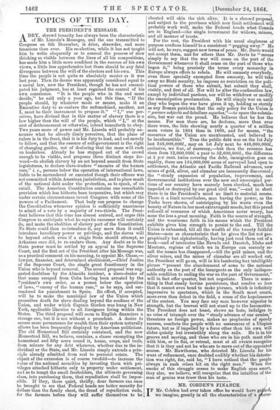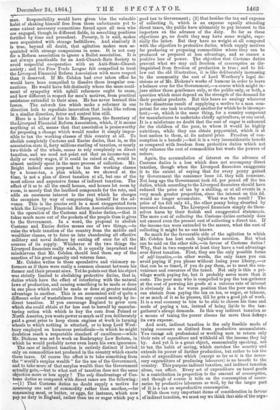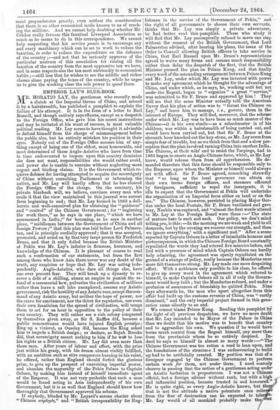MR. COBDEN'S FINANCE.
IF Mr. Cobden had ever taken office he would have go' lied, we imagine, greatly in all the characteristics of a jkatcS- ,i man. Responsibility would have given him the valuable habit of shaking himself free from those unfortunate yet to some extent necessary connections forced upon all men who are engaged, though in different fields, in assaulting positions fortified by time and precedent. Poverty, it is said, makes men acquainted with strange bedfellows. And similarly it is true, beyond all doubt, that agitation makes men ac- quainted with strange companions in arms. It is not easy for a Reform association to ignore a Ballot association. It is not always practicable for an Anti-Church-Rate Society to avoid respectful co-operation with an Anti-State-Church society ; and the Free Trade League felt compelled to treat the Liverpool Financial Reform Association with more respect than it deserved. If Mr. Cobden had ever taken office he would have been compelled to dissolve these irregular con- nections. He would have felt distinctly where the mere senti- ment of sympathy with uphill reformers ought to cease, and how different is respect for men's motives, from practical assistance extended to their aims. He has never learned this lesson. The cobweb ties which make a reformer in one direction loth to repudiate innovation that looks like reform in a similar direction, fetter and control him still.
Here is a letter of his to Mr. Macqueen, the Secretary of theLiverpool Financial Reform Association, which, if it means anything at all, means that that association is praiseworthy for proposing a change which would render it simply impos- sible to tax the working classes of this country at all. To abolish completely Customs and Excise duties, that is, as the association state it, forty millions sterling of taxation, or nearly two-thirds of the whole, means to rely completely on direct taxation, and we need not point out that an income-tax on daily or weekly wages, if it could be raised at all, would be almost entirely spent in the mere process of collection. Mr. Bright indeed once proposed to tax the working classes by a house-tax, a plan which, as we showed at the time, is not a plan of direct taxation at all, but one of the most odious and expensive forms of indirect taxation. The ,effect of it as to all the small houses, and houses let room by room, is merely that the landlord compounds for the rate, and adds an enormous interest to the rent which he charges the occupiers by way of compensating himself for the ad- vance. This is the precise evil in a most exaggerated form which the Liverpool Financial Reform Association denounces in the operation of the Customs and Excise duties,—that it takes much more out of the pockets of the people than, it gives to the Government. In a word, the proposal to abolish Customs and Excise duties means one of two things,—to raise the whole taxation of the country from the middle and wealthier classes, or to force us into abandoning all effective military and naval defence by cutting off once for all the sources of its supply. Whichever of the two things the Liverpool financiers really wish, it is equally imprudent and mischievous that Mr. Cobden should lend them any of the sanction of his great sagacity and veteran fame.
Mr. Cobden writes to these speculative and visionary re- formers as if there were really a common element between his former and their present aims. Yet he points out that his object was strictly limited to abolishing protective duties, that is, duties which have the effect of interfering with the natural laws of production, and causing something to be made or done in one place which could be made or done at greater natural advantage in another. This is an economical evil of quite a different order of wastefulness from any caused merely by in- direct taxation. If you encourage England to grow corn Which she could obtain at far less cost to herself by manufac- turing cotton with which to buy the corn from Poland or North America, you waste power as much as if you deliberately paid a great price to keep steam engines at work in turning wheels to which nothing is attached, or to keep Lord West- bury employed on humorous periodicals—in which he might doubtless reach a respectable standard of excellence—while Mr. Dickens was set to work on Bankruptcy Law Reform, in which he would probably never even learn his own ignorance.
The case of indirect taxation is entirely distinct if levied only on commodities not produced in the country which exacts these taxes. Of course the effect is to take something from the "world's surplus wealth" for the use of the Government, and to take more of that surplus wealth than the Government actually gets,—but to what sort of taxation does not the same objection more or less apply ? The only disadvantage of Cus- toms duties as compared with direct taxes are the following : —(1) That Customs duties no doubt supply a motive for consuming one sort of commodity rather than another,—for consummg meat, or butter, or eggs, for instance, which now pay no duty in England, rather than tea or sugar which pay a good tax to Government ; (2) that besides the tax and expense of collecting it, which is an expense equally attending direct taxes, the public have ultimately to pay interest to the importers on the advance of the duty. So far as these objections go, no doubt they may have some weight, espe- cially the latter. But they have no weight at all compared with the objection to protective duties, which supply motives for producing or preparina,° commodities where they can be produced or prepared at less advantage, and so ensure a positive loss of power. The objection that Customs duties prevent what we may call freedom of consumption as dis- tinguished from freedom of production is true and to fol- low out the old illustration, it is like deliberately increasing to the community the cost of Lord Westbury's legal de- cisions or of Mr. Dickens's works of humour in order to leave a balance over for the Government,—a course which might in- jure either those gentlemen only, or the public only, or both, a question which must depend on the strength of the demand for their peculiar products. But this bears no analogy whatever to the disastrous result of supplying a motive to a man com- petent for one task to attempt another for which he is incompe- tent ;—or, which is the same thing, for a country competent for manufactures to undertake chiefly agriculture, or vice versa'. It is a misfortune no doubt that the cost of sugar is enhanced for the children of the poor, to whom it would be highly nutritious, while they can obtain peppermint, which is at best useless to them, at its natural price. Freedom of con- sumption is a benefit ;—but it is a very inconsiderable benefit as compared with freedom from protective duties which not only enhance the cost of commodities but waste the powers of nature.
Again, the accumulation of interest on the advance of Customs duties is a loss which does not accompany direct taxation, though when the Liverpool financiers exaggerate it to the extent of saying that for every penny gained by Government the consumer loses 3d. they talk nonsense. Not long ago the Government took 5d. per pound off the tea duties, which according to the Liverpool financiers should have reduced the price of tea by a shilling, or at all events in a very much greater proportion, since the interest on this 5d. would no longer accumulate. What was the result ? The price of tea fell only 4d., the other penny being absorbed by increased demand. The Liverpool financiers simply do them- selves harm by their foolish and exaggerated statements. The mere cost of collecting the Customs duties certainly does not exceed even the present cost of collecting a direct tax. If the income-tax were extended to the masses, what the cost of collecting it might be no one knows.
So much for the favourable side of the agitation to which Mr. Cobden has lent such injudicious sanction. But what can be said on the other side,—in favour of Customs duties ? Why, that in two respects at least they have a vast advantage over direct taxation. First, they are the only possible forms of self-taxation,—in other words, the only taxes you can avoid paying if you please without losing your liberty,—or that can be so timed, if you do pay them, as to meet the con- venience and resources of the taxed. Not only is this a pri- vilege worth paying for, but it probably eaves more than it costs. The poor man who is compelled to pay the tax-gatherer at the cost of pawning his goods at a ruinous rate of interest is obviously in a far worse position than the poor man who can abstain from paying the tax on tea, or sugar, or tobacco, or as much of it as he pleases, till he gets a good job of work. It is a real economy to him to be able to choose his time and mode of paying a tax, instead of being liable to the tax- gatherer's abrupt demands. In this way indirect taxation as a means of taxing the poorer classes far more than defrays its own expense.
And next, indirect taxation is the only feasible mode of taxing consumers as distinct from productive accumulators. You cam* ask professional or working men to return only their rate of expenditure and withhold all the income they lay by. And yet it is a great object, economically speaking, not to tax the habit of saving, which enriches the country and extends its power of further production, but rather to tax the scale of expenditure which (except so far as it is the neces- sary expenditure of producing labourers) is no benefit to the country. This purpose indirect taxation and indirect taxation alone, can effect. Every act of expenditure on taxed goods is a contribution in proportion to the amount of consumption, and though of course it tells on the consumption of neces- saries by productive labourers as well, by far the larger part of it is a tax on unproductive consumption. With these very important items of consideration in favour of indirect taxation, we must say we think that side of the argu- meat preponderates greatly, even without the consideration that there is no other economical mode known to us of reach- ing the millions. And we cannot help doubting whether Mr. Cobden really favours this fanatical Liverpool Association as much as be seems to do in this correspondence. We cannot help suspecting that his arrire pensie is to encourage any and every machinery which can be set to work to reduce the taxation, in order to reduce the expenditure on the defences of the country ;—and not that he seriously approves of the particular nostrum of this association for raising all the taxation of the country from the most oppressive tax we have, and in some respects also the tax most unfriendly to economical habits ;—still less that he wishes to see the middle and richer classes alone paying the taxes of the country, while he urges us to give the working class the sole power to spend them.
































 Previous page
Previous page